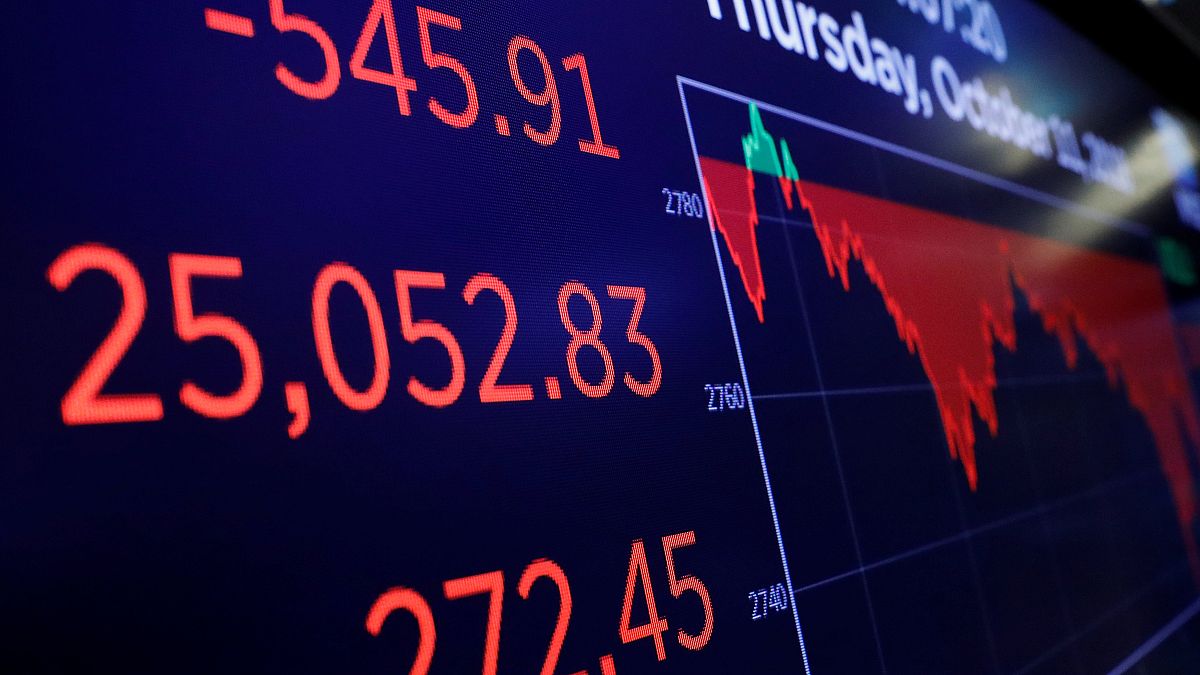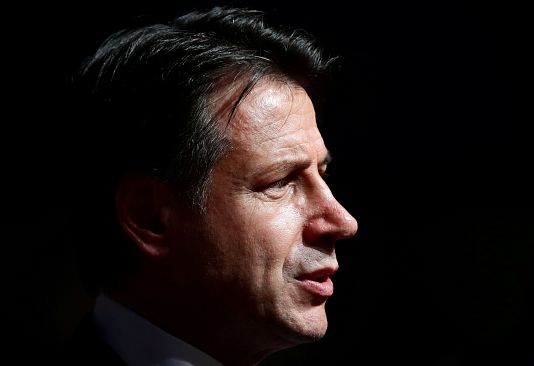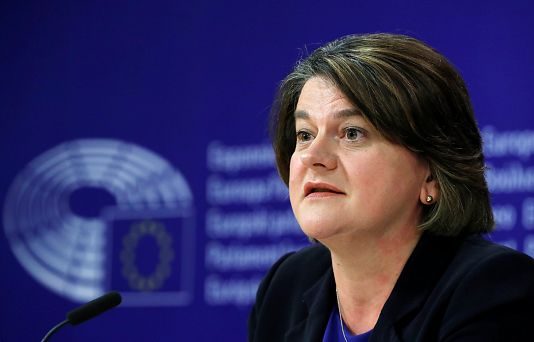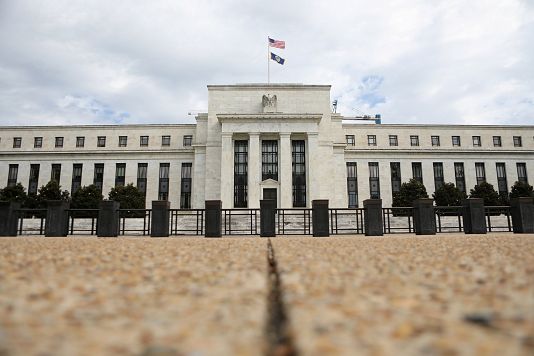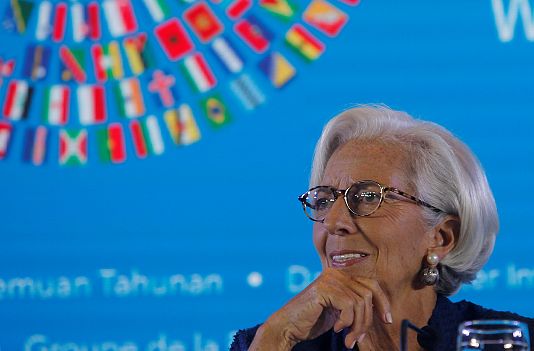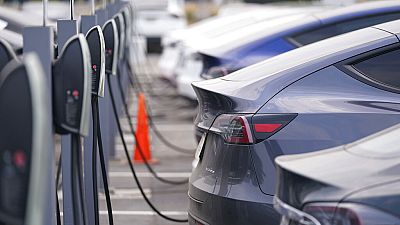As the Winter months loom and flu season rolls in, with Brexit impasses, trade conflicts and a debt-laden Italian budget, the European markets may catch a cold - with geopolitics the cause.
It has been a tumultuous few weeks for markets around the globe, with geopolitical flares sending jitters through the markets. As European politicians face Brexit crunch-talks and a deficit-heavy Italian budget, not to mention protectionist policies, traders may be forced to reconcile with market re-adjustments. Euronews explains the geopolitical and economic factors that may affect the European stock market in the weeks to come.
Low confidence in the Italian economy
Italy's new populist government and the EU are headed toward a direct collision as Giuseppe Conte's cabinet is set to confirm their budget plan this afternoon. The EU is anxious that Italy's deficit-boosting budget plan will drive the country toward a crisis, with top EU officials urging Italy to change course. Conte's government sent shivers up investor's spines after they defied the EU and tripled the budget target deficit for next year. Some fear that the government is punching above its weight when offering costly promises such as a basic income for the poor, laying the groundwork for another crisis.
The government sold its bonds at a yield of 2.51% Thursday, its highest borrowing rate in over 5 years with the Treasury raising €6.5 billion. Reacting to Italy's defiant step, European Commission President Jean-Claude Juncker said: “I would not wish that, after having really been able to cope with the Greek crisis, we’ll end up in the same crisis in Italy.” Italy has the second highest debt in the EU, following Greece which nearly caused the collapse of the single currency just three years ago.
The budget plan will raise the target for next year’s deficit to 2.4% GDP. Although this remains below the 3% EU cap rate, the figure falls dismally below this year's targeted 1.8%, edging debt-laden Italy further away from a balanced budget. Conte hailed the budget as “a change of gear for Italy” while Economy minister Giovanni Tria noted that the country's deficit will rise by €22 billion next year.
Brexit
Whispers of a Brexit deal inching closer whistle through the European Parliament. Leaders will convene in Brussels this Wednesday with the Italian budget and Brexit at the heart of the agenda. If the EU and UK fail to secure a deal, the IMF has warned that the remaining 27 countries would suffer long-term damage equivalent to economic growth falling as much as 1.5% and a 0.7% drop in employment.
The main impasse remains the Northern Irish border. Both history and ideology are ingrained in this issue, notwithstanding economics. Should Northern Ireland leave the EU customs union, as Brexiteers are calling for, it has not been agreed how a border between the Republic of Ireland and the North should operate. All parties aim to avoid a return to a hard border, which would echo three decades of violence known as "The Troubles".
Should the EU and Britain fail to reach an agreement, there will be significant economic ramifications. “The strength of the euro area-UK integration implies that there would be no Brexit winners,” the IMF said. All eyes will be on Brussels over the coming days and weeks while UK Prime Minister Theresa May remains under the thumb of the Northern Irish Democratic Unionist Party (DUP) who prop up her minority government.
DUP will not accept a deal which leaves Northern Ireland out of new UK trade agreements. Economists and politicians alike will be looking at the DUP as the weeks roll on, with their leader Arlene Foster saying that the DUP would vote against May's budget proposal next month if she crosses their Brexit red lines. The Northern Ireland party, with only 10 seats in Westminster, will certainly have an influence on whether a deal can be reached.
US Federal Reserve interest adjustments
There's a well-known phrase in economics - when America sneezes, the world catches a cold. It seems as if global markets were hit with the flu October 10. European stocks plunged to a 20-month low, joining the global stock sell-off that was triggered by Wall Street which suffered its worst losses in eight months. Shares in Asia were similarly hit, dropping to a 19-month low.
Counterintuitively, the market instability was caused by the strong US economy. With rising GDP and low unemployment rates, the US Federal Reserve hiked interest rates in order to normalise the market. This marked the third time the Reserve raised rates in 2018, with another expected by year-end.
Rising interest rates cause investors to flee from what is seen as risky assets such as technology stock, which was severely hit last Thursday. The Federal Reserve policy to hike interest rates will continue as long as the American economy continues to grow. Should the US economy tumble, the Reserve will cut interest rates. The body does this to avoid spikes in inflation while keeping the economy controllable.
Donald Trump is sparring with Federal Reserve officials about their interest policy, an action that is very rare for a sitting US President given the institute's autonomy from the government. Among the phrases Trump has used for the body over the past two weeks include "crazy" and "loco". Should the US economy tilt, European stocks will be affected. The relationship between the US government and the Federal Reserve may change over the coming months and the actions of the central bank will almost certainly have a knock-on effect on markets around the world.
Trade tensions and protectionism
The IMF called for multilateral cooperation instead of a policy of protectionism to dispell trade tensions at the World Bank Annual Meeting held in Bali, Indonesia this week. IMF heads warned against hiking tariffs which could strike the global economy, with trade tensions rising between the US and China. Washington hit Beijing with $200bn tariffs on Chinese goods last month with China retaliating, splashing $60bn on US goods.
A new report released by the Fund projected that the world economy will grow just 3.7%, down 0.2% from their estimate in April. "While financial market conditions remain accommodative in advanced economies, they could tighten rapidly if, for example, trade tensions and policy uncertainty were to intensify," the report warned.
EU politicians also remain fretful of a tit-for-tat trade war with the US that could effect the European car market. In July, Trump pulled back from an explosive 25% import tariff with many feared would trigger a transatlantic trade war with the EU agreeing on importing billions more in US soybeans and natural gas. Both sides agreed to work together toward lowering trade barriers. Earlier this month, German Economy Minister Peter Altmaier warned that time was "getting tight," and called on EU leaders to find "a common solution with the United States so as to prevent a trade war".
As the Winter months loom and flu season rolls in, with Brexit impasses, trade conflicts and a debt-laden Italian budget, the European markets may catch a cold - with geopolitics the cause.
